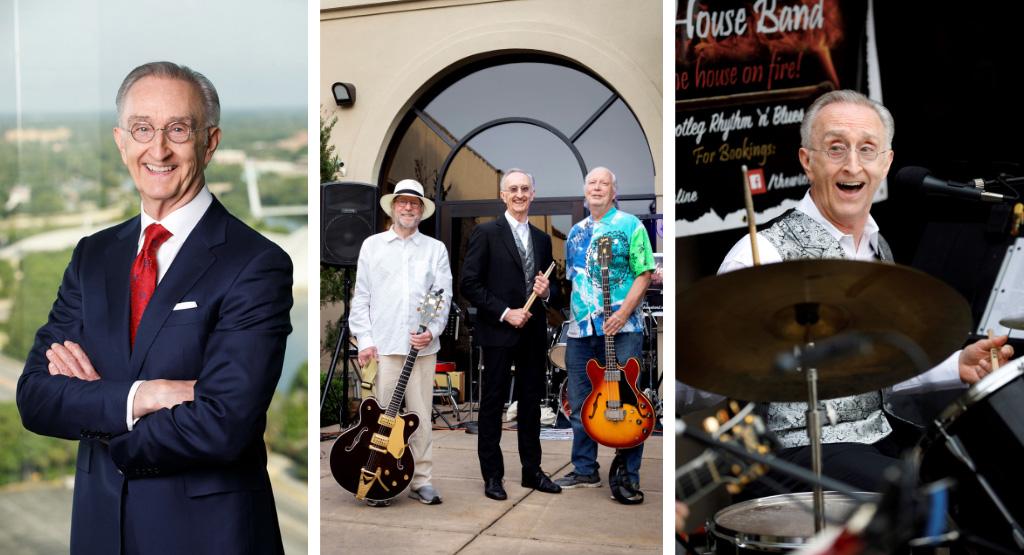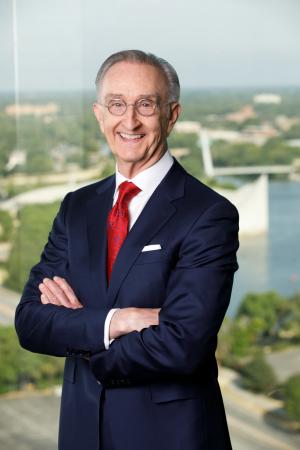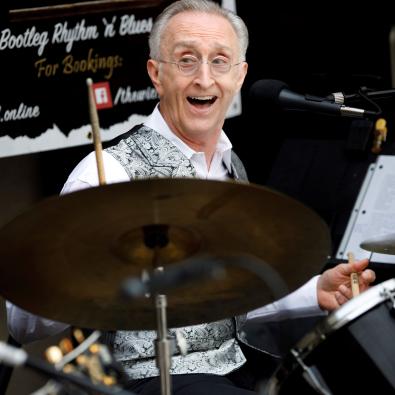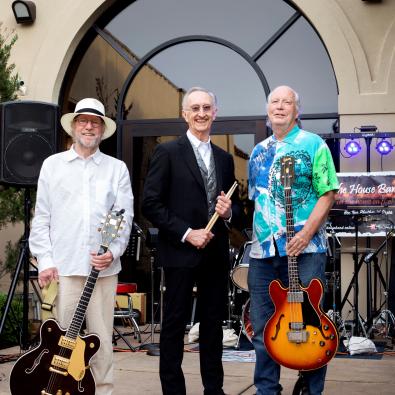Featured Testimonial About Creighton University

If jurors can feel your client’s confusion or her fear or can understand his anger and can feel the injustice of a prosecution, then you have provided one more layer of persuasion to your client’s case. Trying to communicate many of those emotions in song helps me summon similar emotions in service of my client in trial.
By Cindy Murphy McMahon
Most people probably don’t see a connection between music and defending people accused of serious crimes.

But then Dan Monnat, JD’76, isn’t most people.
The Creighton law alumnus has devoted much of his life to both – criminal defense and music – and the two work hand in hand for him.
A founding partner of a five-attorney practice, Monnat & Spurrier, Chartered, in Wichita, Kansas, Monnat is in his 47th year in criminal defense, locally and throughout the Midwest. He specializes in complex, lengthy federal and state jury trials involving crimes such as conspiracy, bank fraud, money laundering and murder.
He’s been ranked among the Top 10 Missouri and Kansas Super Lawyers for the fourth consecutive year, and has handled many high-profile cases, including defending an innocent man accused of being the notorious BTK serial killer.
Then there’s Dan Monnat the musician, a vocalist drummer who plays with other 70-something blues musicians at local and regional festivals, restaurants and clubs.
Monnat has been singing or playing music for as far back as he can remember, beginning with singing in the car with his family and then forming a band in high school with friends. He played in California for a while and was even in a band named the Crime Doctors along with two public defenders, a personal injury attorney and “a couple of real musicians.” In 2020 he and two friends formed The House Band.
His melding of vocation and avocation were recently featured in the American Bar Association’s flagship publication, the ABA Journal: Rock of Ages: This septuagenarian lawyer can beat both his clients’ criminal charges and a drum set.
For him, music helps connect people to the array of human feelings, from the joy of being alive to sadness and grief.

“Whether you’re just singing fun songs that celebrate life, like ‘Papa’s Got a Brand New Bag’ or Bruno Mars’ ‘Uptown Funk,’ or sad songs like Ray Charles’ ‘You Don’t Know Me,’ or the tragedy of a drug addict in a cheap motel on the far side of town longing for Carmelita as in Warren Zevon or Dwight Yoakam’s song,” Monnat says, “music helps us connect with each other for better or worse.”
He likes the way poet Maya Angelou put it: “…people will forget what you said, people will forget what you did, but people will never forget how you made them feel.”
True, but how exactly does that relate to criminal defense?
Monnat says while there is certainly a place in the practice of law for reason and logic, he also sees a profound role for feelings and emotions and mutual understanding.
“If jurors can feel your client’s confusion or her fear, or can understand his anger and can feel the injustice of a prosecution, then you have provided one more layer of persuasion to your client’s case.
“Trying to communicate many of those emotions in song helps me summon similar emotions in service of my client in trial, I believe,” Monnat says.
Additionally, those songs, those emotions, help him, personally, to be passionate, energized and alive.
“If we are going to ask people, jurors, to follow us, we have to be alive ourselves.”
There was even one case he won in which pop music played a key role. He was able to prove that testimony against his client was untrue because of erroneous statements the accusers made concerning a Britney Spears song.
Music is so much a part of his life that it’s automatic. “I sing nearly every day in my office, in the shower, at the piano, in the car,” he says. “In the office, I usually don’t notice it until I see people making funny faces. I’m humming as I walk around and don’t even know it.”
Another corollary between law and music that Monnat adheres to: “For both, practice is essential. As the jazz trailblazer Louis

Armstrong said, ‘If I don’t practice for a day I know it, if I don’t for two days the critics know it, and if I don’t for three days the public knows.’”
The House Band practices about four hours a week and plays a gig about once a week. “I usually practice drumming by myself an hour on Saturday mornings and Monday and Wednesday nights,” Monnat adds, “when my otherwise extremely tolerant wife is away teaching Chinese martial arts.”
Monnat is proud of his criminal defense work and has no plans to slow down.
“Jury trials are monumentally difficult, win or lose, but the whole constitutional system functions better because of them,” he says.
“Jury trials are good for our system whether the accused is innocent or guilty. Forcing the government to prove its case beyond a reasonable doubt to the satisfaction of ordinary people keeps the government honest and keeps democracy participatory.”
He cites another reason vigorous jury trials are important: “We have too many innocent people in prison in America.”
Monnat says looking at the number of people in the last 30 years who have either pled guilty or been convicted and whose convictions have later been proven wrong by DNA exonerations “shows we have a problem.”
He was always interested in the power of authority and the underdog, which is on full display in the practice of criminal defense, and he thanks Creighton for that.
“Creighton had a lot to do with my becoming a criminal defense lawyer,” he says, citing the names of professors familiar to Creighton law grads: Fenner, Shugrue, Birmingham, Green, Neumeister.
Favorite memories he has include an advanced law seminar with 8th Circuit Court of Appeals Judge Donald Lay, two years of moot court experience, and going to Washington, D.C., “to watch our Creighton professor, Patrick Green, argue 4th Amendment search and seizure concepts to the U.S. Supreme Court in Stone v. Powell and Wolff v. David L. Rice.”
He remembers Professor Richard Shugrue informing students that renowned criminal defense lawyer and multiple-term mayor of Las Vegas, Oscar Goodman, was defending a gambling conspiracy case in federal court in Omaha.
“Many of us attended that impressive trial and I was inspired to see the criminal defense concepts we were learning in law school displayed in the courtroom. When I left Creighton, I really had everything I needed to begin serious criminal defense trial work.”


